 Petzlover
Petzlover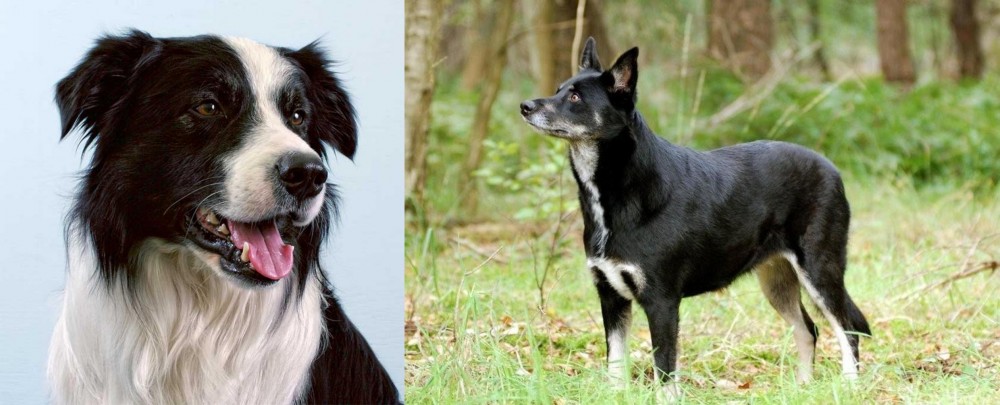 Border Collie is originated from United Kingdom but Lapponian Herder is originated from Finland. Both Border Collie and Lapponian Herder are having almost same height. Border Collie may weigh 15 kg / 33 pounds lesser than Lapponian Herder. Border Collie may live 3 years more than Lapponian Herder. Both Border Collie and Lapponian Herder has same litter size. Both Border Collie and Lapponian Herder requires Moderate Maintenance.
Border Collie is originated from United Kingdom but Lapponian Herder is originated from Finland. Both Border Collie and Lapponian Herder are having almost same height. Border Collie may weigh 15 kg / 33 pounds lesser than Lapponian Herder. Border Collie may live 3 years more than Lapponian Herder. Both Border Collie and Lapponian Herder has same litter size. Both Border Collie and Lapponian Herder requires Moderate Maintenance.
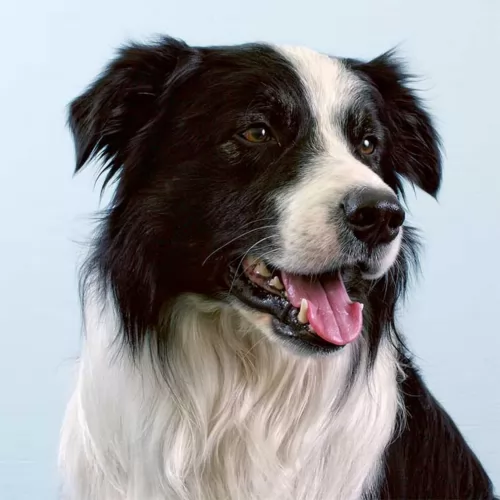 The Border Collie originated in Northumberland and was used to herd livestock. He is particularly well known for his intense stare in controlling the sheep in his care. The name Border Collier wasn’t used until 1915. This was so that the dog could be registered as a separate breed together with other Collie breeds already registered.
The Border Collie originated in Northumberland and was used to herd livestock. He is particularly well known for his intense stare in controlling the sheep in his care. The name Border Collier wasn’t used until 1915. This was so that the dog could be registered as a separate breed together with other Collie breeds already registered.
Sheepdog trials have been held since 1873. The very name of this dog gives you an inkling as to his heritage, as the word ‘Collie’ refers to sheepdogs and comes from Scottish dialect. Today the Border Collie is recognized as the ultimate sheep-herding dog, with his amazing intelligence and herding skills. The Border Collie was recognized by the American Kennel Club in October 1995.
 The Lapponian Herder hails from Finland. He is a dog which was developed for the Sami people who needed a strong dog to herd and guard their reindeer. The Sami people knew that they could reply on these Spitz-type dogs to efficiently manage their reindeer herds.
The Lapponian Herder hails from Finland. He is a dog which was developed for the Sami people who needed a strong dog to herd and guard their reindeer. The Sami people knew that they could reply on these Spitz-type dogs to efficiently manage their reindeer herds.
As with many other dog breeds, their numbers dwindled during and after the Second World War, and breeders then stepped forward to restore the herding dog populations. The dog was developed from Spitz-type herding breeds which were crossed with black and white Karelian Bear Dogs as well as other dog varieties.
Both the Lapponian Herder and the Finnish Lapphund were recognized as the same breed, with the Lapponian being separated into its own breed in 1966.
The dog is one of Finland’s five national dog breeds and in 2017, the Lapponian Herder was accepted to the Foundation Stock Service program.
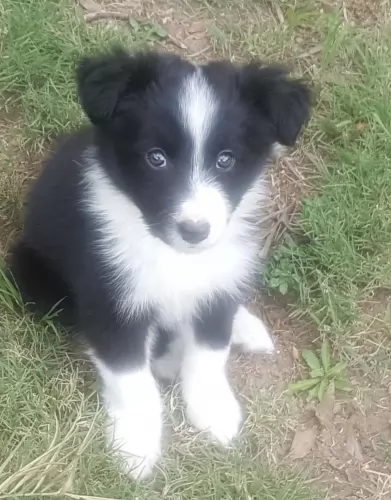 Utterly responsive, intelligent, alert and keen, the medium sized border collie loves nothing more than to be actively working. He requires both mental and physical stimulation. The ideal height for this very intelligent dog is 46 – 53cm and they weigh in at about 14 – 22kg.
Utterly responsive, intelligent, alert and keen, the medium sized border collie loves nothing more than to be actively working. He requires both mental and physical stimulation. The ideal height for this very intelligent dog is 46 – 53cm and they weigh in at about 14 – 22kg.
People who have been to sheepdog trials can only marvel a this dog and his intense stare, moving the sheep to precisely where his master wants them. The dog has a moderately long and smooth coat with a dense topcoat, with soft weather resistant undercoat. Most common color is black and white but other colors such as chocolate and white, liver and white or blue merle are also seen.
There are a few Border Collies which have a single-colour coat. He has a long feathery tail and the ears can be either erect, semi-erect and in some instances, even dropped. He has brown eyes but sometimes with the Merle Border Collie you can get one eye or part of the eye which is blue.
Border Collies are playful, energetic dogs who just love living in homes where the family involves him in all their activities. Because he is so intelligent, he is demanding of his human family, wanting them to take notice of him and provide him with lots of clever games and sports. If he is left without involvement, he can become frustrated and destructive. That is why it is so important to choose your pet carefully.
These highly energetic dogs require owners who recognize this need and are prepared to provide him with lots of games, walks and runs.
 This is a medium sized dog and both male and female dogs stand between 43 and 51cm in height and weigh in the region of 30 to 35kg.
This is a medium sized dog and both male and female dogs stand between 43 and 51cm in height and weigh in the region of 30 to 35kg.
They have a medium length double coat which is straight and fairly harsh to the touch. They are moderate shedders.
Looking much like a combination German Shepherd and Wolf, the Lapponian Herder’s coat can be dark grey, cream, dark brown and black. He has erect ears, brown eyes and a long bushy tail which can be held low but which he raises somewhat over the back when he is alert. The head is wedge-shaped with tapering muzzle and black nose.
Energetic and lively while also being calm, the Lapponian Herder makes an excellent family pet.
As a very active breed, he is going to need an active, outdoor-type of owner. He is an intelligent, independent dog who wants to be kept busy. Because of his smartness he is easy to train ad socialize, being a dog that wants to please.
Training and socialization will do wonders for him, particularly because he is a vocal dog, loving to bark and air his views. With the training you can call out to him ‘be quiet’ and he will, as he becomes an obedient dog who is a pleasure to have around in all kinds of situations.
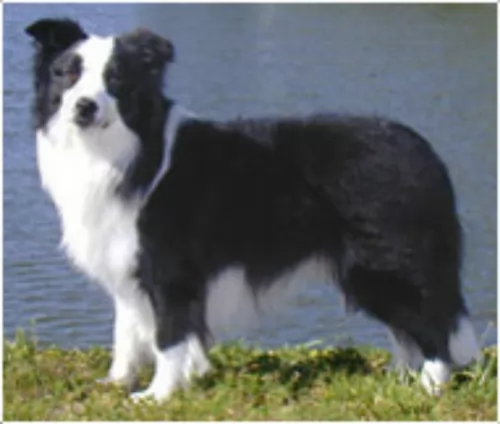 The Border Collie is such an awesome working dog breed, being of tremendous help to farmers. With their endless energy and stamina, given the chance he would want to be working all day. This medium sized dog will need a family where they are hard working and active just like him. He makes a wonderful pet with the right owners and if everyone is active in the family, he becomes your devoted soulmate.
The Border Collie is such an awesome working dog breed, being of tremendous help to farmers. With their endless energy and stamina, given the chance he would want to be working all day. This medium sized dog will need a family where they are hard working and active just like him. He makes a wonderful pet with the right owners and if everyone is active in the family, he becomes your devoted soulmate.
He is sensitive to what his owner wants and that is also because he is highly intelligent. Shower your wonderful pet with lots of love, give him lots of attention and plenty of activities, and you’ll have an awesome friend for life.
 The Lapponian Herder is a great family pet who is social and who loves being in the company of his human family, being able to get on well with children in the home too, as well as pets.
The Lapponian Herder is a great family pet who is social and who loves being in the company of his human family, being able to get on well with children in the home too, as well as pets.
He plays a protective role too, not being quiet when it comes to barking and warning his family of intruders.
They’re very energetic dogs but can be docile indoors. He is smart too, being able to learn quickly. Bring one of these Lapponian Herders into your home, and you’re guaranteed a splendid family pet.
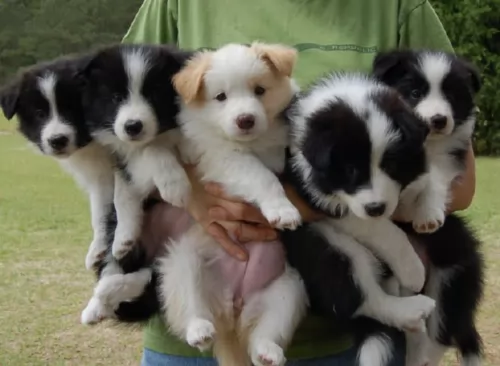 If your Border Collie is healthy, he can live to be 14 years of age and longer. There are one or two dog ailments that are more common in this breed, so it is wise to be aware of what can go wrong, although with good care it is highly unlikely.
If your Border Collie is healthy, he can live to be 14 years of age and longer. There are one or two dog ailments that are more common in this breed, so it is wise to be aware of what can go wrong, although with good care it is highly unlikely.
Primary epilepsy, known as idiopathic epilepsy can be seen in your dog before the age of 5 years, and although a genetic link in border collies has not yet been identified, idiopathic epilepsy is more prevalent in some breeds. Seizures in your dog are caused by electrical disturbances in the brain and treatment may be for life. While epilepsy in dogs can’t be cured, the condition can be managed with medication recommended by your vet and then he can lead a healthy life.
Collies are prone to developing hip dysplasia, which is an inherited condition with abnormal formation of the hip socket. For your pet it can mean lameness as well as painful arthritis. You’ll see your collie dog battling to rise after lying down. It is actually common in lots of dog breeds, but more so in larger breeds.
This is an inherited problem that can lead to your dog going blind. About 70 to 97% of collies in the UK and the United States are affected. Your veterinarian will examine your dog to determine the extent of the defect. It is common in the first year of a dog and can be be prevented if caught early.
 The Lapponian Herder, with good care, should be able to live for 10 to 14 years.
The Lapponian Herder, with good care, should be able to live for 10 to 14 years.
He is generally believed to be a healthy dog breed, but as with most other dogs, there are a few health issues which can crop up. These can be eye- and infections as well as skin allergies. These can be highly irritating for your dog and painful too, and veterinary intervention may be required.
Other serious dog problems can be bloat and joint dysplasia.
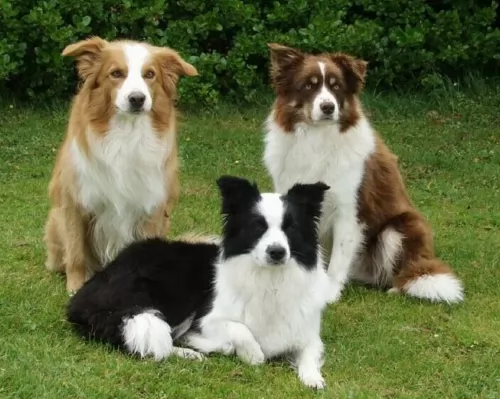 This is a dog that will need plenty of exercise and attention. He won’t do well cooped up in a tiny home. He’ll want lots of place to run and play and with his owners involved in his activities. It is unfair of any dog owner to buy a dog like this and then leave him so that he becomes distressed from being ignored.
This is a dog that will need plenty of exercise and attention. He won’t do well cooped up in a tiny home. He’ll want lots of place to run and play and with his owners involved in his activities. It is unfair of any dog owner to buy a dog like this and then leave him so that he becomes distressed from being ignored.
Do your dog a favor and see that he is socialized as a puppy and trained as he grows older. Once he has been trained, he becomes a super pet, obedient, sensitive and willing to please.
Border collies shed throughout the year, and with Summer his shedding becomes a bit more. He will require a good brushing at least twice a week to get rid of loose hairs and to ensure that the long hair doesn’t become tangled. He isn’t considered hypoallergenic and is regarded as a safe pet to have for people with allergies.
This high energy working dog will require top quality food from the top brands if you intend feeding him from commercially produced dog food. He will certainly need raw meat added to this food from time to time to ensure you stave off skin problems such as rashes. You can also add in rice, meat and vegetables for variety to ensure his is getting in all the minerals and vitamins he needs. Fresh, cool water should always be available to him day and night.
 The Lapponian Herder has a dense coat and he is considered to be an average shedder with some seasonal shedding.
The Lapponian Herder has a dense coat and he is considered to be an average shedder with some seasonal shedding.
To keep the coat sleek and shiny, get into the habit of brushing him twice a week. With the assistance of the right grooming tools you will be able to clip his nails if he doesn’t wear them down naturally. Just be careful though, because cutting to far down can mean cutting him where the nerves are and this can cause your pet great pain.
When you brush him, check his ears at the same time and use a damp cloth to wipe away the excess wax and dirt.
His teeth should also be cleaned with canine toothpaste and toothbrush. If you are apprehensive about keeping up with these grooming procedures, there are professional dog grooming experts who will attend to your dog’s grooming needs.
The Lapponian Herder is a medium sized dog full of energy.
If you feed him commercially manufactured kibble, you’ll read on the packaging about the type of food it is and what portion sizes to give him. Always go for the top quality brands that are made with good meaty ingredients and not filled with the likes of colorants and preservatives.
It is healthier to give him 2 smaller meals a day as opposed to one large meal. Try and give him some home-cooked food to bring in some variety. Excellent food for him would be some cooked chicken, brown rice, pasta and some cooked or raw vegetables added into his kibble. Every now and then it can be good for him to have a bit of raw meat added into his food.
Your Lapponian Herder must have constant access to cool, fresh water. Remember to wash the bowl out regularly, as the dog’s saliva enters the water when drinking.